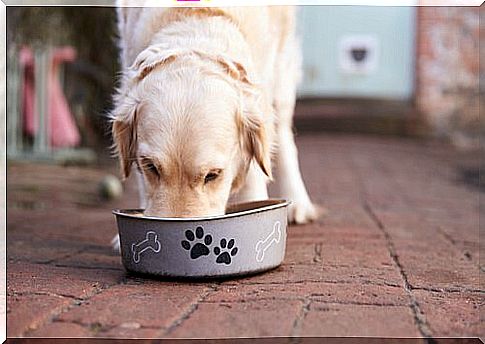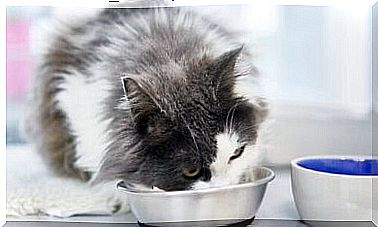What Is High Cholesterol In Pets?

It’s not just humans who can be affected by high blood cholesterol levels. Although they are diagnosed less frequently, our pets can also suffer from problems caused by hyperlipidemia. So if you want to know more about high cholesterol in pets, let us help you.
Next, let’s understand how high cholesterol can harm our pets’ health.
In addition, we will present the main causes of hyperlipidemia and the essential preventive measures to prevent it.
What is cholesterol?
It is one of the essential fats (or lipids) that make up our body. Although it has gained a bad reputation for the problems caused by high cholesterol, our body produces it naturally. After all, these molecules are present in all our cells.
In addition to facilitating the digestion of ingested food, cholesterol also participates in the synthesis of vitamin D and the production of various hormones.
As we know, there are two main types of cholesterol: HDL cholesterol and LDL cholesterol. LDL can accumulate in arteries as it has low density. As such, it is commonly known as “bad cholesterol”.
In turn, high-density HDL helps maintain a balanced metabolism. In addition, it removes toxins and excess LDL from the body. Therefore, it became popularly known as the “good cholesterol”.
What does it mean to have high cholesterol?
Hyperlipidemia, better known as high cholesterol, is a complex disease that affects a large part of the human population worldwide. However, it is not a condition unique to humans as it can also occur in animals.

The hyperlipidemia or hypercholesterolemia is characterized by the permanent presence of high levels of fats in the bloodstream.
In simpler terms: it is when blood cholesterol is always high and exceeds healthy levels.
Therefore, it is important to differentiate occasional or occasional elevations from hyperlipidemia.
After eating some foods or experiencing stressful situations or strong emotions, it is normal for cholesterol levels to increase. However, they should normalize in a short amount of time.
Therefore, people and pets with hyperlipidemia have high cholesterol levels permanently, even in normal everyday situations. Therefore, this implies health risks for people and animals that live in this condition.
Causes of hyperlipidemia
The causes of high cholesterol in pets are very similar to the causes of hyperlipidemia in humans.
In general, high cholesterol is associated with an unbalanced diet and a sedentary routine. In addition, certain metabolic disorders or congenital problems can lead to hyperlipidemia.
Below, we’ll look at the most common causes of high cholesterol in pets:
- A diet that is excessively high in meat, dairy, or fatty foods.
- Sedentary lifestyle.
- Pregnancy
- Nephrosis (degenerative disease that affects the kidneys).
- Problems in the functioning of the thyroid gland.
- Diabetes
- pancreatitis
- Excessive functioning of the adrenal glands.
- Cholestasis (obstruction of the bile ducts)
- Congenital abnormalities in enzymes that remove lipids or in lipid transport proteins.
- Aging
Symptoms of High Cholesterol in Pets
Hyperlipidemia is a disease that usually silently progresses through the body of our pets.
Its first symptoms are generic and difficult to identify in animals. Therefore, owners only notice the problem when the framework is already advanced.

For this reason, prevention through a balanced diet is essential. Also, it is important to have blood tests periodically to check your cholesterol levels. These are the main symptoms of high cholesterol in pets:
- Abdominal pain
- Skin blemishes or lesions
- Dermal xanthomas (presence of yellowish or orange fatty nodules on the skin).
- Convulsions
- Changes in the nervous system
- Treating High Cholesterol In Pets
Therefore, after confirming the diagnosis of hyperlipidemia, the veterinarian can choose an appropriate treatment for your pet’s needs.
In order to lower blood cholesterol levels, your health care provider will most certainly recommend a change in diet.
In general, diets with less than 10% fat are used. In addition, you need to include high-quality, fiber-rich proteins.
Finally, your veterinarian may prescribe a drug or natural supplement to help control blood fats.
How to prevent high cholesterol in your pet?
The best way to prevent high cholesterol in our pets is to provide a high quality, balanced diet.
Therefore, we should not give human foods rich in fats, sugars or chemicals to our partners.
In addition, a daily exercise routine will also be essential for your pet to maintain an active metabolism and a healthy weight.
So keep in mind that a sedentary lifestyle increases the risk of behavioral problems, as well as causing numerous illnesses.
Last but not least, your pet will need lifelong preventive veterinary monitoring.
In addition to visits to the vet every six months, remember to follow the vaccination and deworming schedule.









